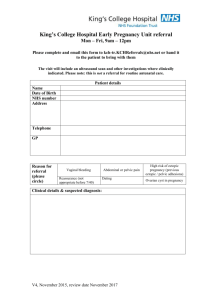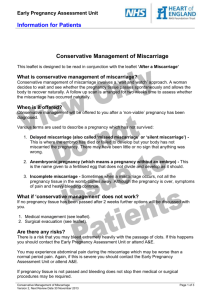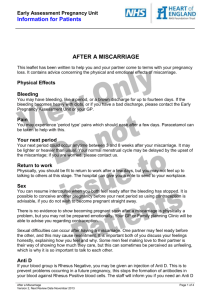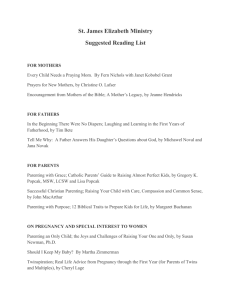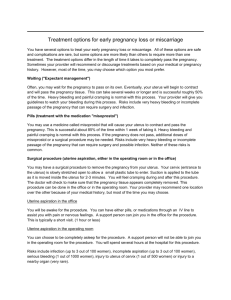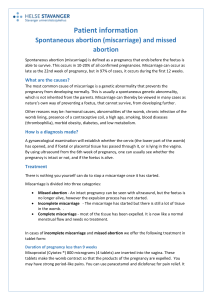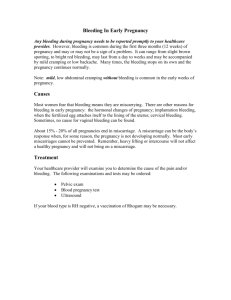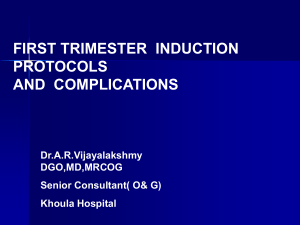Leaflet6 - Heart of England NHS Foundation Trust
advertisement
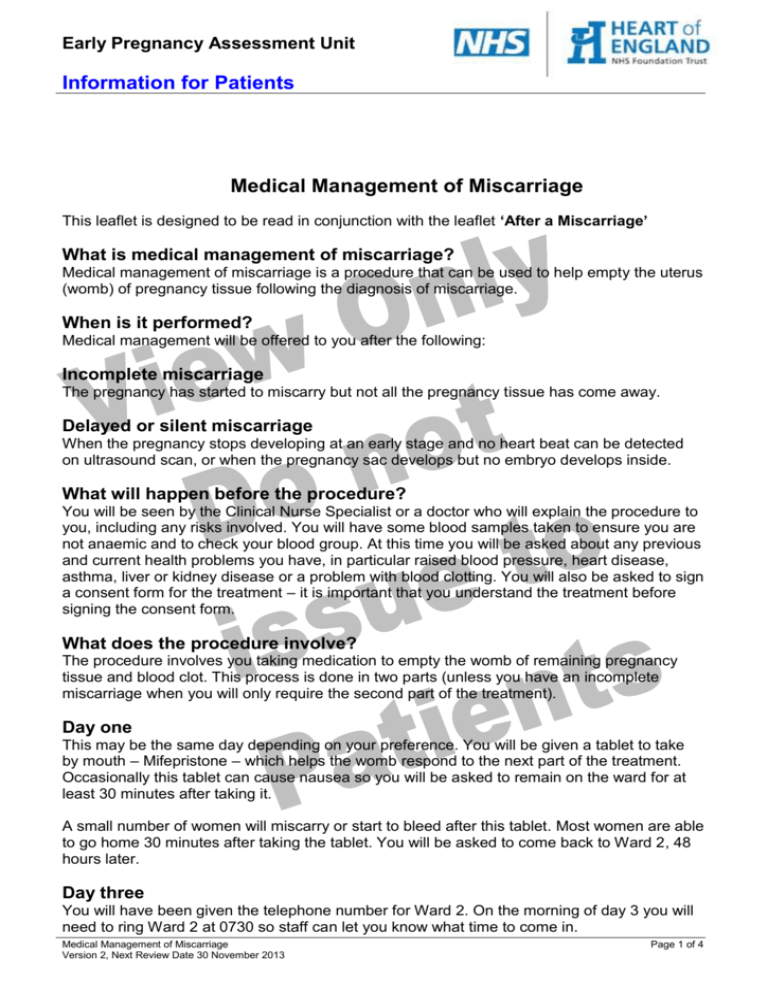
Early Pregnancy Assessment Unit Information for Patients Medical Management of Miscarriage This leaflet is designed to be read in conjunction with the leaflet ‘After a Miscarriage’ What is medical management of miscarriage? Medical management of miscarriage is a procedure that can be used to help empty the uterus (womb) of pregnancy tissue following the diagnosis of miscarriage. When is it performed? Medical management will be offered to you after the following: Incomplete miscarriage The pregnancy has started to miscarry but not all the pregnancy tissue has come away. Delayed or silent miscarriage When the pregnancy stops developing at an early stage and no heart beat can be detected on ultrasound scan, or when the pregnancy sac develops but no embryo develops inside. What will happen before the procedure? You will be seen by the Clinical Nurse Specialist or a doctor who will explain the procedure to you, including any risks involved. You will have some blood samples taken to ensure you are not anaemic and to check your blood group. At this time you will be asked about any previous and current health problems you have, in particular raised blood pressure, heart disease, asthma, liver or kidney disease or a problem with blood clotting. You will also be asked to sign a consent form for the treatment – it is important that you understand the treatment before signing the consent form. What does the procedure involve? The procedure involves you taking medication to empty the womb of remaining pregnancy tissue and blood clot. This process is done in two parts (unless you have an incomplete miscarriage when you will only require the second part of the treatment). Day one This may be the same day depending on your preference. You will be given a tablet to take by mouth – Mifepristone – which helps the womb respond to the next part of the treatment. Occasionally this tablet can cause nausea so you will be asked to remain on the ward for at least 30 minutes after taking it. A small number of women will miscarry or start to bleed after this tablet. Most women are able to go home 30 minutes after taking the tablet. You will be asked to come back to Ward 2, 48 hours later. Day three You will have been given the telephone number for Ward 2. On the morning of day 3 you will need to ring Ward 2 at 0730 so staff can let you know what time to come in. Medical Management of Miscarriage Version 2, Next Review Date 30 November 2013 Page 1 of 4 Information for Patients Shortly after admission a nurse will show you around the ward. Your partner will be allowed to stay with you if you wish them to do so. You will be given some Misoprostol tablets (prostoglandin) which will be placed in the vagina by one of the nurses or a doctor. Misoprostol opens the cervix (neck of the womb) to allow the pregnancy tissue to pass. It is usual to experience some bleeding and crampy pain. You will be offered painkillers if needed. Some women experience side effects from the Misoprostol. The most common are nausea, diarrhoea, dizziness and hot flushes. Once you have been given this first dose of Misoprostol, you will be asked to use bedpans every time you pass urine. This is to allow the nurses to check your blood loss and assess whether you have passed any pregnancy tissue. If no tissue has been passed within three hours, a second dose will be given, orally. If no tissue passed again after three hours a third dose will be given. Up to five doses can be given if required, until the nurses on the ward are sure that pregnancy tissue has been passed. You will be required to stay on the ward until this process is complete. Once pregnancy tissue is passed, you will be allowed home as long as you are not bleeding heavily. What if the procedure does not work? If no pregnancy tissue has been passed after the five doses of Misoprostol then this can be managed by three methods: 1. Allowing the womb to empty naturally - you will be followed up in EPAU after 2 weeks for assessment and a scan to ensure the womb is empty. 2. Repeat the medical management after a 24 hour rest. 3. Surgical evacuation. These options will be discussed with you and appropriate arrangements made. Are there any risks? This is a very safe procedure however, like any procedure there are potential risks involved. The main risks of the procedure are: Heavy bleeding requiring treatment such as the use of drugs, blood transfusion or surgical evacuation. Infection of the lining of the womb requiring treatment with antibiotics. Reaction to the drugs used. Failure. What else should I expect? Vaginal bleeding may occur for a few days following the procedure. This should be like a light period and should settle, although it may last a week or longer. If the bleeding is heavy and there are clots it is best to get checked by your GP as it may be a sign of infection. While you are bleeding use sanitary towels, not tampons, to reduce the risk of infection. Avoid intercourse until the bleeding has stopped. It is normal to experience some crampy abdominal pain. This can be treated with painkillers such as Paracetamol. Medical Management of Miscarriage Version 2, Next Review Date 30 November 2013 Page 2 of 4 Information for Patients If you require any further support or information please do not hesitate to contact one of the numbers listed. Contact Numbers: Good Hope Hospital Early Pregnancy Assessment Unit Telephone (0121) 424 7747 Jacqui Rutter – Clinical Nurse Specialist Telephone Number (0121) 424 9737 E-mail jacqui.b.rutter@heartofengland.nhs.uk Ward 2 Telephone Number (0121) 424 9202 Heartlands Hospital Early Pregnancy Assessment Unit Telephone Number 0121 424 3506 Senior Nurse, Angela Sampson. Gynaecology Matron Tracey Nash Bleep Number 2178 Email tracey.nash@heartofengland.nhs.uk Gynaecology Assessment Unit: - 0121 424 3505 Sister Paget: 0121 424 2750 Our commitment to confidentiality We keep personal and clinical information about you to ensure you receive appropriate care and treatment. Everyone working in the NHS has a legal duty to keep information about you confidential. We will always ask you for your consent if we need to use information that identifies you. We will share information with other parts of the NHS to support your healthcare needs, and we will inform your GP of your progress unless you ask us not to. You can help us by pointing out any information in your records which is wrong or needs updating. Additional Sources of Information: Go online and view NHS Choices website for more information about a wide range of health topics http://www.nhs.uk/Pages/HomePage.aspx You may want to visit one of our Health Information Centres located in: Main Entrance at Birmingham Heartlands Hospital Tel: 0121 424 2280 Treatment Centre at Good Hope Hospital Tel: 0121 424 9946 or contact us by email: healthinfo.centre@heartofengland.nhs.uk. Dear Patient We welcome your views on what you liked and suggestions for how things could be improved at this hospital. If you would like to tell us and others about your experience please make your comments through one of the following sites: NHS Choice:Patient Opinion:I want great care:doctor) www.nhs.uk www.patientopinion.org.uk www.iwantgreatcare.org (Here you can leave feedback about your Medical Management of Miscarriage Version 2, Next Review Date 30 November 2013 Page 3 of 4 Information for Patients Be helpful and respectful: think about what people might want to know about this hospital or how your experiences might benefit others. Remember your words must be polite and respectful, and you cannot name individuals on the NHS Choice or Patient Opinion sites. If you have any questions you may want to ask about your condition or treatment, or anything you do not understand or wish to know more about, write them down and your doctor will be more than happy to try and answer them for you. Medical Management of Miscarriage Version 2, Next Review Date 30 November 2013 Page 4 of 4

